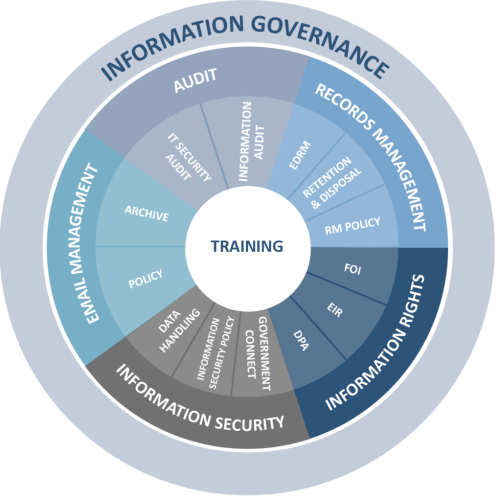With over 2.5 quintillion bytes of data being created each and every day, the understanding of Information Governance and Records Management strategies is supremely important for organizations that need to remain compliant. The great news is, there are tools to help you navigate the increasingly complex process.
We’re here to cut through the haze with crystal-clear distinctions between Information Governance and Records Management. These are tools crafted to refine your strategy in managing this deluge.
Key Takeaways
- Information Governance (IG) is a wider plan that looks at all the data in a company. It helps follow rules and keep things safe.
- Records Management is about keeping track of certain files and making sure they are easy to find when needed.
- FileTrail is a leader in IG, helping companies with physical records management and staying within laws. They have an ISO 27001 Certification for keeping data secure.
- Since the digital age, managing information has changed. Now we use computers more than paper files to store information.
- Good Information Governance can stop legal problems by making sure all kinds of data are handled right according to the law.

Evolution of Records Management and Information Governance
The journey of managing our ever-growing mountain of data began in earnest with traditional records management, but as the digital age took root and complex regulations emerged, we’ve witnessed a paradigm shift.
Enter Information Governance—a holistic approach that transcends basic record-keeping to ensure data across the entire organization is handled with precision and foresight.
Records Management in the \’80s and \’90s
Back in the ’80s and ’90s, we managed records in a very different way. Physical paper records were everywhere. Files stacked up in cabinets and rooms filled with boxes of documents.
We kept all sorts of information like this, from important letters to employee files. People called archivists took care of these paper records. They organized them and made sure we could find what we needed later on.
We followed specific rules for keeping these papers safe and getting rid of ones we didn’t need anymore, known as retention schedules. It was a big job making sure everything was accurate and that private info stayed private.
But times changed quickly, and soon computers began to store much of our information digitally, shifting how we thought about record keeping forever.
Shift Towards Digital Records
In the ’80s and ’90s, we kept our records on paper, in folders, and locked away in big metal cabinets. But things changed fast. We started to store almost everything on computers. Emails, electronic documents, databases, and all kinds of digital media became important pieces for keeping information safe.
We see it everywhere now: Digital files are the new norm. They’re easier to search through than piles of paper. They save space that used to be filled with those bulky cabinets. Plus, you can get to your digital records from anywhere—as long as you have a computer or a smartphone with you.
This switch has made us rethink how we handle all this information because there’s just so much more of it and it comes from everywhere—social media posts, cloud services, even sensors that are part of the Internet of Things (IoT).
Emergence of Information Governance in the mid 2000s
Around the mid 2000s, we saw a big change. Information Governance (IG) started to become important. Before this time, people mainly focused on keeping records in paper form or simple digital files.
But then we began dealing with all sorts of new data—emails, electronic documents, databases, and even social media stuff. It wasn’t just about storing it; we had to manage this information smartly.
This is where IG came into play. It looked at the whole picture of how information flows through our businesses. From creating or getting new data to throwing it out when we don’t need it anymore—and everything in between! With IG, we help companies follow rules better and cut down legal risks by watching over all types of data more closely.
This isn’t just good for staying out of trouble; it makes sure that companies are doing things the right way across the board.
Key Differences Between Records Management and Information Governance

Understanding the nuances between Records Management and Information Governance is critical; while both deal with managing information, they diverge on scope and practice. Information Governance encompasses a broader strategy, coordinating policies across various types of data and stakeholders, whereas Records Management focuses on maintaining specific records efficiently throughout their lifecycle.
IG as a Strategy for Controlling Information
Information Governance (IG) is like a big umbrella. It covers the whole process of managing and protecting all the information our company has. This isn’t just about keeping old files in order; it’s also making sure that we handle our emails, documents, and even instant messages right.
We use IG to make sure that everything we do with our information follows the rules and doesn’t get us into trouble.
We also have a team of people from different parts of our business who come together to decide how best to manage this information. They look at what risks there might be, like someone seeing something they shouldn’t or losing important data, and then they figure out ways to keep those bad things from happening.
Their job is super important because it helps everyone in our company do their jobs better without worrying about messing up with the information we’re trusted with.
Key Stakeholders in IG
We understand that Information Governance (IG) isn’t a one-person show; it involves many different players. Key stakeholders in IG play crucial roles in making sure information is handled well.
These include folks from Records Management who keep track of important files and make sure nothing gets lost. People in Information Technology help by taking care of the digital side, ensuring our data systems work smoothly.
There are also experts from Information Security who protect our data from unwanted eyes, while the Risk Management team looks out for any possible problems that could pop up. The Compliance group checks to see if we follow all rules and laws, and Legal teams offer advice on how things should be done according to government policy.
Over in Data Science, they’re busy analyzing all kinds of information to find useful insights. Archival Administration saves older records so we can look back at them later on, and Business Units use the information to meet their goals better every day.
Each person brings their expertise together so we can manage both structured data like documents in a file system and unstructured data such as emails piling up in an inbox smartly and safely.
IG as a Governing Body for All Information
Information Governance, or IG, is like the boss of all the data our company has. It looks after every piece of information and makes sure everything is tidy and in its right place.
Think of it as the rules that help us handle our data better. This isn’t just about keeping things safe; it’s also making sure we use information in a smart way.
We make an IG plan so that managing our records becomes easier and less stressful. With this plan, we can take care of legal stuff, follow important rules, and keep privacy tight for any personal details we have on file.
It’s like having a big umbrella that keeps all our information dry from the stormy weather of risks and changes.
Benefits of Information Governance
Understanding the myriad benefits of Information Governance can fundamentally transform how an organization manages its reservoir of data, ensuring that operations are streamlined, risks minimized, and regulatory compliance is maintained.
To delve further into these advantages and their impact on your enterprise’s success, continue exploring with us.
Encourages Compliance
We make sure everything follows the rules with information governance. It guides how we handle all kinds of data, from emails to big reports. This helps us match up with what our company expects and keep things in line.
We work together with people who manage records, tech experts, security teams, and many others. Our goal is to ensure that every piece of data is treated right.
Having a good plan for information governance means fewer headaches for everyone. It keeps us out of trouble by making sure we don’t break any laws or lose important info. We can trust our systems more because they help us know exactly what to do with each document or record.
Mitigates Legal Risks
Information Governance helps keep us out of trouble with the law. It’s like having rules that make sure we handle all our information the right way. This is really important because there are so many laws about keeping private things safe, especially when it comes to personal details like someone’s name or address.
We have to follow these rules, or else we could get in big trouble.
Our Information Governance plan looks at all the different parts of our business and makes sure every piece of information is looked after properly. Lawyers are a big part of this plan because they know a lot about what can go wrong if we don’t follow the rules.
By working together, we avoid mistakes that could lead to legal problems or even fines for our company.
Aligns with Corporate Governance Policies
Our approach to Information Governance (IG) helps make sure we follow the rules that guide our company. This makes it easier to run things smoothly and stay out of trouble. We keep track of all sorts of information, from emails to documents, in a way that fits with these important rules.
By keeping our IG in line with corporate governance policies, we are better at managing risks and protecting sensitive data like personal details. This smart strategy supports us in doing our jobs well and earning trust for being careful with information.
It’s all about making sure we handle data right and respect privacy laws every step of the way.
Allows for More Organized Records Management
We understand how important it is to keep track of all our documents and information. Information Governance (IG) steps in to help us make sure everything is neat, clear, and easy to find.
It’s like having a smart system that tells us where each piece of paper or digital file belongs. This way, we can manage our records without feeling lost in heaps of data.
With IG, we have rules on how to handle every bit of information from the start of its life until we don’t need it anymore. We use tools and software that are made for keeping our records safe and well-organized.
This means less worry about losing important stuff and more trust that we’re handling our information the right way. Plus, finding what we need gets much faster because everything has its own place in this tidy system.
FileTrail: A Leader in Information Governance
In the realm of Information Governance (IG), FileTrail has distinguished itself as a frontrunner, setting industry benchmarks for managing information lifecycle and compliance in our increasingly digital world.
Their suite of solutions seamlessly integrates with existing infrastructures to revolutionize how organizations handle their physical and electronic records.
Specializing in Physical Records Management
We take pride in managing physical records with great care at FileTrail. We know how important it is to handle papers, files, and documents the right way. Our team works hard to keep these items safe and organized so you can find what you need quickly.
Our services here include keeping track of when to keep or throw away certain papers. We make sure everything follows the law and your company’s rules. Also, we help move important files safely from one place to another.
With our ISO 27001 Certification, you can trust that we keep your physical records secure. Trust us for top-notch handling of all your paper-based information needs!
Retention, Disposition, Matter Mobility, and Governance Management
At FileTrail, we understand the complex needs of managing information. We handle key aspects including retention, disposition, matter mobility, and governance management.
- Retention: Keeping records for a certain time is crucial. We make sure that your documents stay safe for as long as they’re needed. Then, when it’s time, we help you remove them correctly.
- Disposition: Once documents reach their end date, getting rid of them is important. Our system lets you do this without worry. We follow your company rules and the law to dispose of things right.
- Matter Mobility: Moving files and information around can be tricky. Our tools help move everything smoothly from one place to another, so work doesn’t stop.
- Governance Management: Overseeing all your information matters a lot. We give you a way to keep an eye on everything. This keeps you in control and makes sure rules are followed.
ISO 27001 Certified
We’re pretty proud to say FileTrail has reached a big milestone. Our team worked hard, and we got ISO 27001 Certified. This means we take protecting data very seriously. We set up strong systems that keep information safe.
It’s not just about keeping secrets; it’s making sure everything is private like it should be.
This certification shows that our privacy policies are top-notch. When clients use our services, they can trust that their files are in good hands, whether those files are on paper or in the computer.
Keeping things secure is a big deal for everyone these days, and we’ve got it covered.
Conclusion
In the world of managing information, we see two stars: Records Management and Information Governance. They work together to keep our data safe and useful. Think of Records Management as sorting your books at home, while Information Governance is like having rules for the whole library.
As we use more digital stuff, these two help us stay on track. Let’s make sure we handle our information the right way with their guidance.
FAQs
1. What is the difference between information governance and records management?
Information governance manages all types of data in a company, focusing on data security and privacy policies. Records management (RM) deals with controlling records during their lifecycles to meet legal requirements.
2. Can artificial intelligence be used in information governance?
Yes, artificial intelligence (AI) helps manage big data by using machine learning (ML) to improve accuracy and make smart decisions about document management within an enterprise content management (ECM) system.
3. Is cloud-based better than on-premises for managing my company's data?
Cloud-based solutions offer access from anywhere and can handle more data but may raise concerns about security. On-premises systems keep your data close but might not be as flexible or up-to-date.
4. How do I protect personally identifiable information in my records?
You must follow best practices for data security, like having a strong privacy policy and using tools for version control to track changes accurately.
5. Do all companies need to worry about information governance and records management?
Yes, every business should care about managing its documents properly through ECMs or other document management systems to ensure they use their datasphere well while keeping private info safe.





